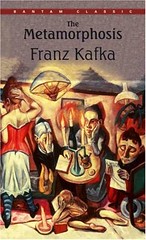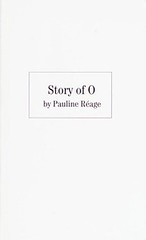
The Lightning Thief / Rick Riordan
New York : Disney Hyperion Books, 2006
Originally published: 2005
Percy Jackson & the Olympians, bk. 1
375 p.
Percy Jackson is about to be kicked out of boarding school... again. And that's the least of his troubles. Lately, mythological monsters and the gods of Mount Olympus seem to be walking straight out of the pages of Percy's Greek mythology textbook and into his life. And worse, he's angered a few of them. Zeus's master lightning bolt has been stolen, and Percy is the prime suspect.
My good friend Ryan expressed an in interest in seeing the first Percy Jackson movie this weekend, so like a good book-to-movie conversion enthusiast, I devoted part of my snow day yesterday to reading the first novel, The Lightning Thief. It's both good and bad, but... well there's really no excuse for the bad.
To begin, a summary: A boy with a mean guardian finds out he has powers for which evil dudes want him dead, so he goes to a special training facility to hone said powers where the kids are sorted into groups wherein the members have similar personalities and one group is unpleasant, ugly, and mean. There he finds out he is the Chosen One, sort of. Then he befriends a really smart girl and an awkward boy who doesn't believe in himself, and they face insurmountable odds to retrieve a powerful artifact from the embodiment of evil, and in the end they find out that a supreme bad guy that is supposed to be gone is gathering followers and planning on returning. Everybody cheers for the boy and his friends at the end.
That said, THIS IS NOT A HARRY POTTER KNOCK OFF! It was written in 1994. It's just really unfortunately similar in so many ways beyond the bounds of the typical "every story borrows from every other" rules. But honestly: pure coincidence.
Anyway, I love Greek mythology, and Riordan did a lot right and had some great ideas here. Unfortunately, it was really poorly executed. Riordan is no fancy writer. Neither was Rowling, to be fair, but she had some sense of language and narrative elegance. I don't believe that Percy is a child, mostly because Riordan is trying SO HARD to make him sound like one. And that's the main problem I have with this book: he's trying too hard.
A lot of the creatures and gods (who have shallow, caricatured personalities based on their "domains") feel thrown in, like he wanted to get as much in there to show us how creative he was. It makes the book feel episodic, which is fine, but all this "then he met Medusa", "then he met the stretching giant", "now he's in a children's casino for 4 days" didn't tie into the main thread. At the end, the book implied that the monsters were attacking him because of the evil bad dude and their quest, but I don't buy it.
The casino episode was especially bad. The trio wanders into a building where they are given free reign of a gorgeous hotel/arcade/casino for children. Some sort of spell is put on them where they eat and play games and suddenly Percy finds out a kid has been there since 1977 and thinks only 2 weeks have gone by, so he snaps out of the reverie. Then he snaps Annabeth out of it by saying the word "spiders", which she is afraid of. Then they leave without incident and 4 days have passed. No explanation, no consequences. The scene, which had no dramatic tension, served only to advance the plot 4 days. See, Riordan set an arbitrary 10-day deadline for the kids to finish the quest, and then when he realized that it doesn't take 10 days to get from New York to LA, so he did that.
But parts of the book were pretty ok. The overall plot still has a lot of potential, but he really needs to not play around so much with the gimmicky "modernized mythology" crap. Get the narrative down and the story right, and you won't have to make reference to playing Hillary Duff on a pan flute to get a cheap giggle.
I hear the next books get better, and this can make a great set of movies, so I'm on board with the franchise. I'm also glad that this is one of those books that "gets kids reading", but honestly, is it really a victory to "get kids reading" if what they're reading has the same low standards of quality as the television shows everyone claims are rotting their brains? Substandard literature is NOT a gateway drug to good literature.










